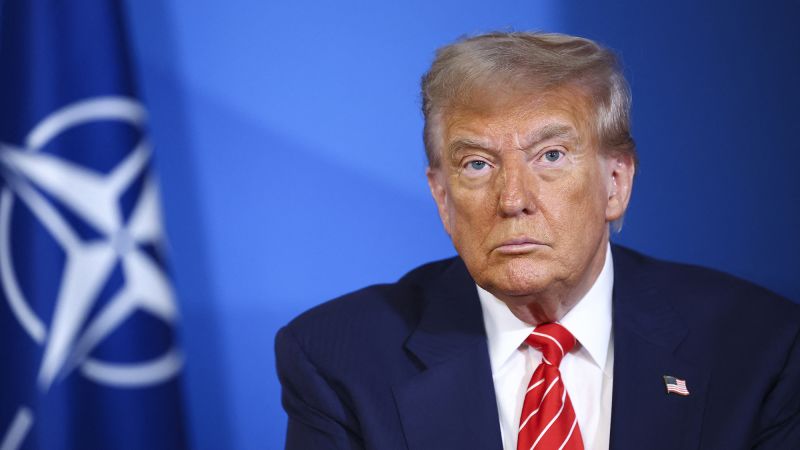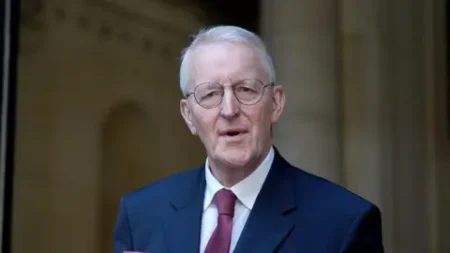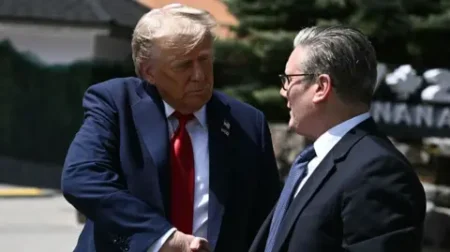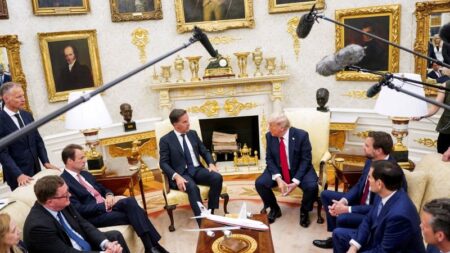In a significant shift in foreign policy, President Donald Trump is intensifying his stance towards Moscow as he explores various avenues to deescalate the ongoing conflict involving Ukraine. Recent disclosures from officials with knowledge of the situation suggest that Trump is contemplating the possibility of permitting shipments of long-range missiles to Ukraine. Such missiles would enable Ukrainian forces to target deeper into Russian territory, specifically aiming at critical infrastructures in significant cities such as Moscow and St. Petersburg.
Over the past several weeks, Trump has engaged in discussions with European allies, during which he has refrained from dismissing the introduction of offensive weapons into Ukraine. This shift in approach aligns with requests made by Ukrainian President Volodymyr Zelensky, who has persistently sought additional support from the United States. Sources indicate that despite the complexities surrounding military aid, Trump’s open-mindedness towards supplying Ukraine with certain offensive capabilities could represent a turning point in the conflict.
In private conversations, Trump has exhibited curiosity regarding Ukraine’s operational capacity to execute strikes well within Russian borders. Reports from a source briefed on these discussions reveal that Trump has inquired about the potential for Ukrainian forces to launch attacks against key Russian cities, including Moscow and St. Petersburg. This line of questioning was notably discussed during a recent phone call between Trump and Zelensky, drawing earlier mentions in the Financial Times, which first broke the story.
Officials from the U.S. administration, aware of the sensitive nature of these conversations, noted that Trump’s inquiries were part of a broader dialogue on the war, and were not necessarily indicative of a concrete policy change. Nevertheless, the Ukrainian government responded with surprise to Trump’s remarks. Zelensky himself indicated that successful strikes against Russian targets would be viable if Ukraine were adequately supplied with the necessary weapons.
Additionally, there have been ongoing discussions involving Ukraine, several European nations, and the United States regarding the provision of long-range systems that could bolster Ukraine’s military effectiveness. Notably, Ukraine has previously demonstrated capabilities of reaching targets in Moscow and the surrounding areas via drone strikes.
In the wake of the Financial Times article, the White House issued a statement asserting that Trump’s comments were misinterpreted. Spokesperson Karoline Leavitt emphasized that the President’s inquiries were not intended to advocate for escalation in violence, arguing that he is actively seeking to bring a halt to hostilities and foster peace.
This series of events illustrates the delicate balancing act Zelensky faces in his diplomatic engagement with the United States. Recognizing the limited support that may remain available, Zelensky is keen to capitalize on any opportunity to secure U.S. military assistance.
Moreover, Trump’s NATO envoy, Matt Whitaker, recently indicated that while the initial focus is on supplying defensive weapons—such as Patriot missile batteries—there remains room for the possibility of more offensive armaments being considered in the future. Whitaker underscored that the dichotomy between offensive and defensive systems can be ambiguous, stating, “All weapons are both offensive and defensive.”
Looking back, it is crucial to note that at the conclusion of President Joe Biden’s term, he authorized the shipment of advanced long-range Army Tactical Missile System (ATACMS) to Ukraine, a measure that Trump subsequently labeled a “big mistake.” He expressed frustration over not being consulted about such actions before taking office.
As Ukraine continues to seek military aid, requests for Joint Air-to-Surface Standoff Missiles (JASSMs) have been lodged but remain unfulfilled. For the time being, the priority for military support appears to be geared towards establishing robust air defense systems—specifically, deploying Patriot batteries that are crucial for intercepting Russian ballistic missiles.
According to NATO Secretary General Mark Rutte, there is a commitment to expedite the provision of these vital systems while simultaneously ensuring that shipments from existing European stockpiles can quickly reach Ukraine. This ongoing dialogue highlights the urgency with which NATO aims to address the military challenges facing Ukraine, underscoring, “When it comes to ammunition and missiles, we will work on this from now on, every hour, making sure that the stuff gets into Ukraine.”











